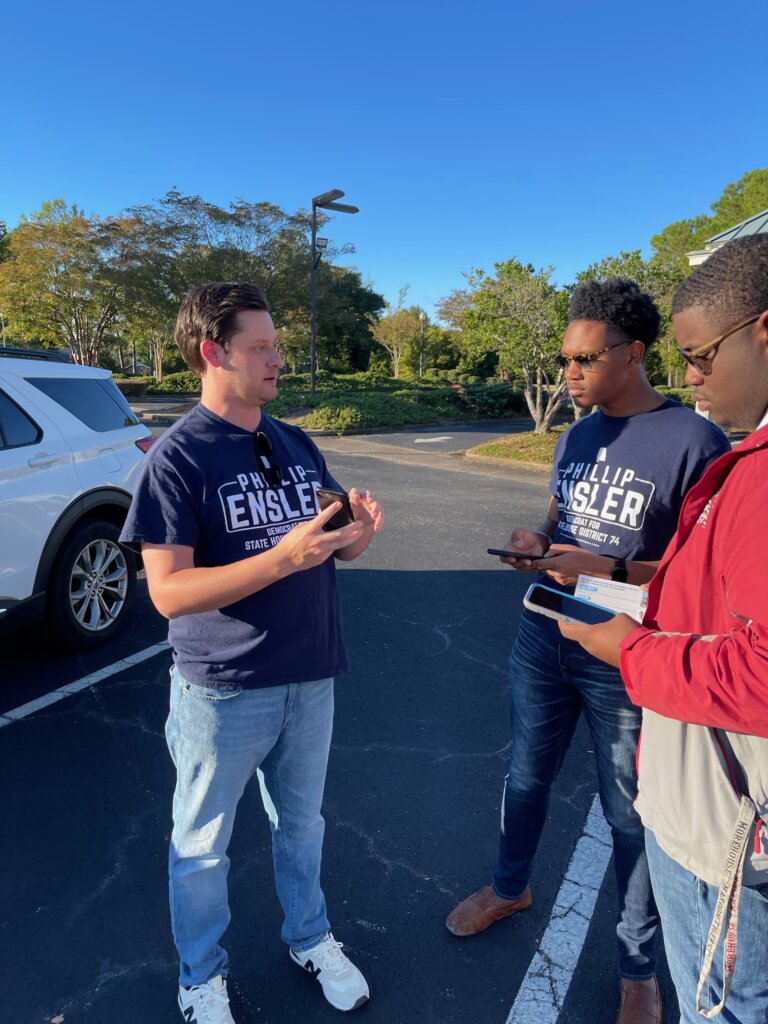There are no Jews in the Alabama legislature. That could soon change.
Raised in Manhattan, Phil Ensler was inspired by the civil rights movement to move to the Deep South and work on racial justice issues

Graphic by Angelie Zaslavsky
MONTGOMERY, Ala. — Democrats’ best chance to flip a seat in the ruby red Alabama legislature this November would also give the Statehouse its only Jewish lawmaker.
Phil Ensler doesn’t make a big deal of his Jewishness in his campaign material, though the Democratic nominee mentions in his biography that he’s the executive director of the Jewish Federation of Central Alabama. With a nod to local sensibilities, he describes himself in a campaign flyer as a “servant leader,” a Christian-inflected term commonly used by evangelical candidates.
But in a fundraising letter to his Jewish supporters, Ensler, who attended the Hebrew school at Manhattan’s Central Synagogue and graduated from Yeshiva University’s law school, bills his campaign in Jewish terms.
“I am excited about the opportunity to become the only Jewish member of the Alabama state legislature,” he wrote.

Ensler, 32, has a chance to unseat Republican incumbent Charlotte Meadows because of a 2021 redistricting that brought more Democrats voters into the East Montgomery district, which is now 55% Black.
He is trying to build a coalition of Black voters, moderately liberal whites and independents, and the few Jews in the area. Ensler has lived in Alabama, home to about 10,000 Jews, since he moved to Montgomery a decade ago, spurred by his interest in the civil rights movement to join Teach for America in the Deep South.
Here he’s worked to build networks — through his teaching, mentoring, law practice and leadership of the federation — that he is relying on to bring out the vote.
Aylon Gipson, a Montgomery native who now attends Morehouse College, said he knows firsthand how Ensler has devoted himself to the community, and that most people he’s met canvassing either know the former teacher or have heard of him.
“He’s tried his best to understand the city,” Gipson said.
Called South
As a high school student on Manhattan’s Upper East Side, Ensler became interested in civil rights history and government service, which he says gave him his life’s direction. As a student at George Washington University, he toured Alabama’s civil rights museums and monuments.
“I was humbled and inspired by standing in the very places where Martin Luther King Jr., John Lewis, Rosa Parks, and countless other heroes and foot soldiers had the courage to stand up for a more just and equal Alabama,” he writes on his web site.
After graduating in 2012, Ensler returned to Montgomery, and taught social studies at the predominantly Black Robert E. Lee High School.
That same year, he founded Marching On, a weeklong program in which he would take as many as 70 students to Washington, D.C. They met with government officials and other policymakers, and visited local universities and cultural institutions. The program ultimately included students from all five of the city’s public high schools.
But after two years with Teach for America, Ensler concluded that he could make more of an impact as a lawyer. At Cardozo Law School, Ensler interned with the Southern Poverty Law Center in Montgomery, working on juvenile rights and education issues. He also worked with the Innocence Project, and in the office of New York Gov. David Paterson, the state’s first Black chief executive.
After passing the Alabama bar, he went to work for Steve Reed, Montgomery’s first Black mayor, and in 2017 joined the Alabama Appleseed Center for Law and Justice, which focused on evictions and predatory payday loans.
In 2019, Ensler was the subject of a flattering profile in the Montgomery Advertiser, the city’s largest daily newspaper, which named him its monthly “Community Hero.”
“At an intersection of politics, education and legal defense,” the newspaper wrote, “Ensler is an advocate for those in need.”
Campaign finance
A seat in the Alabama legislature has not flipped in a dozen years. To make that happen, Ensler has raised a healthy $300,000, which allows him to send weekly mailers to voters and buy television ads. That compares to Meadows’ $100,000 war chest.
He said the race has not been marred by antisemitism. He’s also careful to approach issues in a way that is unlikely to rile voters in either party. Though he strongly supports abortion rights, it’s not mentioned in his campaign materials. He talks about public safety — “common sense policies that reduce gun violence” — but not about regulating assault weapons.
Meadows advocates a ban on abortions with no exceptions, and a “permitless carry” gun law. She also wants to use $440 million in federal Covid money for prison construction, which Ensler opposes.
Much of Ensler’s political and financial support has come from his family and friends — “cousins, aunts, uncles, college friends,” he says. Additional support has come from the Central Alabama Jewish community and Jewish donors outside his district and outside of Alabama — but none from Jewish billionaire George Soros, who has been the target of antisemitic tropes.
Ensler is a member of Agudath Israel/Agudath Israel Etz Ahayem, Montgomery’s main Conservative/Sephardi synagogue, but he also makes appearances at Beth Or, the region’s Reform synagogue.
“The Jewish community is very supportive of me,” he said, in part by not asking him to step down from his day job leading the federation during the campaign. “They want me to win.”















